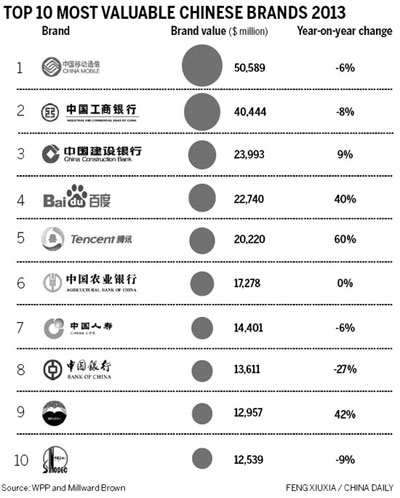
A recent Millward Brown study also found that although international consumers remain mostly uninformed about Chinese brands, they are at least willing to try them out.
Wang says three main challenges still face Chinese brands: "Achieving consistent quality, creating an emotional connection, and establishing trust" in a global economy where a product's provenance is often less important than its quality, design and value.
The issue of trust in Chinese brands has been stretched to the limit in recent months amid fears that some of China's high-end baijiu had been contaminated.
The country's largest producer by market capitalization, Kweichow Moutai, issued a statement earlier this month saying the level of potentially toxic plasticizers - which can be used to soften plastic food and drinks containers - found in its products fell within China's permitted limit, after a local online report suggested tests in Hong Kong on bottles of Moutai baijiu found high levels of the chemical.
Camus, for its part, said it sells Small Batch Blend Moutai, which is specially designed and produced for the overseas market, and that its quality can be guaranteed.
As the case continues to be investigated, the link with Camus is likely to have had a beneficial influence on the public relations effort surrounding the whole issue. Experts have suggested that Chinese companies should well be seen to be working with well-known brand names in future, preferably by way of mergers and acquisitions, when taking their brands overseas.
Jane Liu, a researcher at Analytics & Insight MEC China, said brands are intangible assets that can be slow and costly to build, and that China, as a latecomer to the global marketplace, is at a disadvantage.
"A quick way to catch up is by M&As, an option that Chinese companies are now pursuing," she said.
Recent examples include Lenovo, which acquired a majority stake in Medion AG, a German home appliance, in 2011, and Haier, which acquired small and large appliance biomasses from Japan's Sanyo.
In cases such as these, the strategy for rebranding the newly merged or acquired companies is crucial because one of the greatest problems that M&As face is cultural integration.

Copyright ©1999-2011 Chinanews.com. All rights reserved.
Reproduction in whole or in part without permission is prohibited.